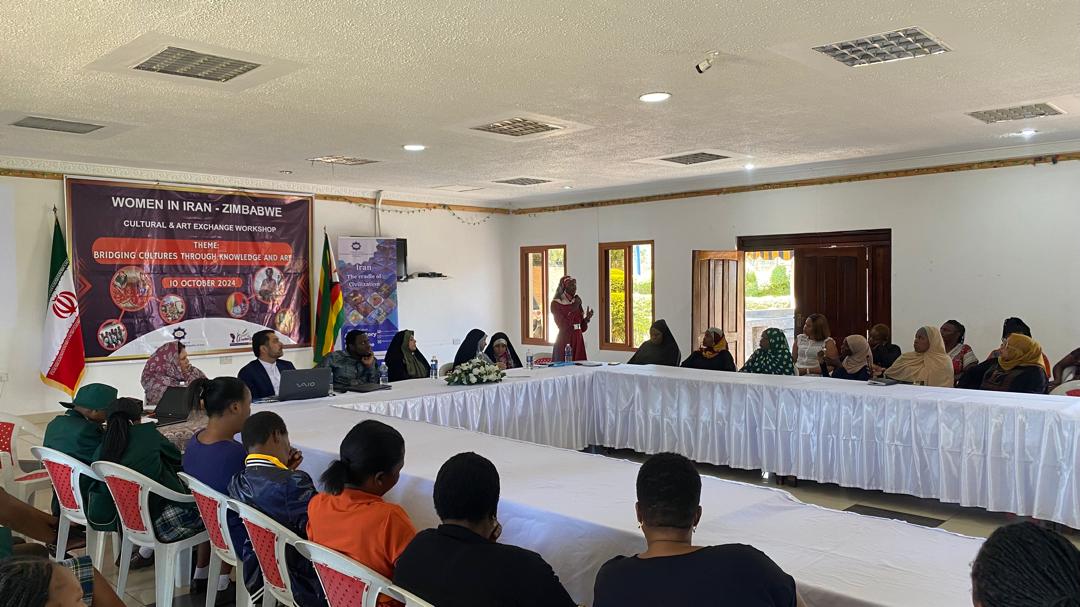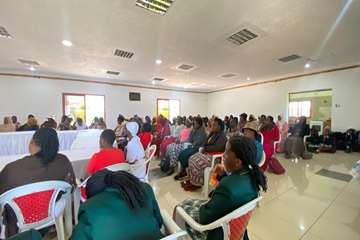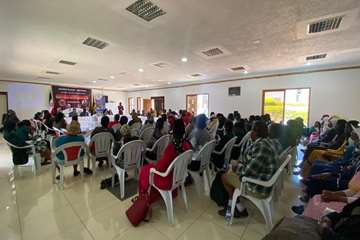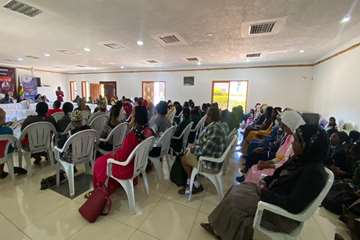CULTURAL CENTRE OF THE EMBASSY OF IRAN HOLD INTERACTIVE CULTURAL EXCHANGE WORKSHOP FOR WOMEN
10 October 2024 Women in Zimbabwe have hailed the Islamic Republic of Iran for advancing and promoting the rights of Iranian women as well as in their upliftment and empowerment.

Speaking during an interactive Cultural and Art exchange workshop, running under the theme: Bridging Cultures Through Knowledge and Art, that was held at Ale Muhammad Mosque in Harare this Thursday, the 10th October 2024, Zimbabwean women, who among them were literary writers, gender activists, media personalities and school teachers and learners, among others, all praised the Islamic Republic of Iran for uplifting and empowering the Iranian women as provided for by the new constitution that established the Islamic Republic of Iran following the victorious Islamic Revolution of 1979.
The workshop was jointly organized by the Cultural Centre of the Embassy of the Islamic Republic of Iran in Zimbabwe and Women Writers Support Network Africa.
The workshop was graced by Madam Mariam Sajadi, the representative for women in the Islamic Culture and Relations Organisation of Iran (ICRO) Dr Zahra Sadat Mirhashemi, the Dean in the Faculty of Theology at Alzahra university in Iran, and Madam Pavaneh Amirian, the Founder and Director of Panian Sewing Design and Handicrafts School.
Iranian women have unprecedently scaled up the ladder in all facets of the socio, political and economic spheres of the Islamic Republic of Iran.
In welcoming all the women who graced the workshop, the Cultural Counsellor at the Embassy of the Islamic Republic of Iran in Zimbabwe, Mr Hamid Bakhtiyar said the interactive workshop was one way of enhancing the exchange of information and ideas between the Iranian and Zimbabwean women.
He said the exchange programme opens a new chapter in the enhancement of new relations between women from the two sisterly nations.
Mr Bakhtiyar said relations between Iran and Zimbabwe were very friendly and cordial.
Speaking during the workshop, Dr Zahra Sadat Mirhashemi, gave a rundown of the achievements of the Iranian women after the victory of the Islamic Revolution.
She said Iranian women now fully enjoys their rights as enshrined in the country’s supreme law, the constitution.
She noted that women are empowered to take part in politics, in the economic affairs and activities of the country as well as in all the social clusters of Iran such as in education, where women constitute the bulk of the students and school teachers, and in women’s medicine where the bulk of the surgeons are women. She said women are also leading large corporate organisations just like their male counterparts.
Dr Mirhashemi said in sport, Iranian women are active in all facets of sport, from competing on the global stage to the management aspect of the sport. In all these activities, their dignity as Iranian women is respected as they are allowed to compete in their nationally accepted dress code,
She also spoke of the role of the women in the families. She said women play the dominant role of keeping the family unit together.
Mrs Pavaneh Amirian said culture defines who a people are. She said Iran enjoys its diverse culture through the traditions of its many communities who make up the integrated and diverse culture of the country.
Mrs Pavaneh noted that women in Iran plays a very significant role in shaping the Islamic Republic of Iran’s culture. Most of the women are into arts, a sector that heavily contributes to Iran’s diverse culture.
Miss Rahma Mabveni, who was standing in for Madam Hajar Makwinja, the Director of Fatima Zahra (as) women’s center in Harare said Muslim women in Zimbabwe plays a significant role in the socio political and economic affairs of the country. She said their programmes are development oriented as they focus on the emancipation and empowerment of the Muslim women.
Mrs Mabveni said as women, they also play a leading role in promoting interfaith dialogue forums that promotes social cohesion between various women groups in the country.
She pointed out that women play a significant role in their own economic empowerment through involving themselves in businesses that guarantees them a significant income.
She noted that Muslim women are also involved in religious propagation, but face an array of cultural and religious misconceptions from a society that is not well versed in Islam as a peaceful religion.
In welcoming the guests from Iran, the Zimbabwean women gave their guests a snippet of what the Zimbabwe culture and traditions are all about. They were introduced to Zimbabwe’s decorum of welcoming visitors, the role of totems in Zimbabwe’s various communities and how traditional marriages are solemnized, among others. It was indeed a cultural exchange which was greatly appreciated by all the participants.




Write your comment.